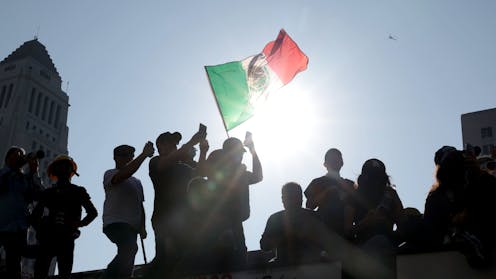Mexican flags flown during immigration protests bother white people a lot more than other Americans
- Written by Edward D. Vargas, Associate Professor, School of Transborder Studies, Arizona State University

Agents with U.S. Immigration and Customs Enforcement conducted a series of raids throughout Los Angeles and Southern California[1] in early June 2025, sparking protests in downtown Los Angeles and other cities, including New York[2], Chicago[3] and Austin, Texas[4].
Some demonstrators expressed growing frustration with ICE by showcasing the Mexican flag, which has become the defining symbol of the protests[5] in Los Angeles.
The use of the flag has also become the subject of intense debate in the media.
Some outlets have depicted the flag as symbolizing ethnic pride[6], solidarity with immigrants and opposition to the Trump administration[7].
Others have called it the “perfect propaganda[8]” tool for Republicans and conservatives, some of whom have referred to the Mexican flag as the “confederate banner of the L.A. riots[9].” They point to its use as evidence of anarchy and a city taken over by immigrants[10].
But what do Americans think about protesters waving the Mexican flag, and why?
Much of our knowledge surrounding this question[11] is based on the 2006 immigrant rights protests[12] across the United States, which occurred in a much less politically polarized era[13]. Additionally, a vast majority[14] of protesters then brought U.S. flags compared with other national flags, including the Mexican flag.
Research[15] published in 2010 found that even though the public was more likely to be bothered by protesters waving the Mexican flag than the U.S. flag, that difference was largely absent once you divided the public into subgroups, including white people, Latinos and immigrants.
To reexamine public attitudes toward protesters waving the Mexican flag, we conducted an online survey experiment[16] among 10,145 U.S. adults in 2016.
As political scientists[17] who specialize in Latino politics[18] and immigration-related issues[19], we tested how exposure to the Mexican flag versus the American flag shaped opinion about protests during Trump’s first presidential campaign in 2016.
We found that even though much of the public continued to be less bothered by the American flag than the Mexican flag, there were also important and perhaps surprising differences in protest attitudes between white Americans and other racial and ethnic groups.
More or less bothered
In the study, we randomly divided respondents into two groups: a treatment group and a control group. Respondents in the treatment group were shown an image of protesters waving a Mexican flag. Respondents in the control group were shown an image of protesters waving the U.S. flag. After viewing the image, respondents were then asked about the extent to which they supported or were bothered by the protests.
Overall, 41% of the respondents said they were bothered by protesters waving the Mexican flag, and 28% said protesters waving the U.S. flag bothered them.
Our results show important differences in opinion between racial and ethnic groups.
White respondents were more likely than any other racial and ethnic group to say they were bothered by protesters waving Mexican flags. Sixty-nine percent of white respondents said they were bothered, 31 percentage points more than the average of nonwhite respondents.
However, 51% of white respondents were also bothered by the image of protesters waving U.S. flags. By contrast, just 20% of Latinos, 33% of Black Americans and 34% of Asian Americans said they were bothered by protesters waving U.S. flags.
Put differently, large majorities of nonwhite respondents were supportive of showing U.S. flags at protests despite their more positive views toward Mexican flags.
What explains racial differences?
When taking a deeper look at what causes Americans to feel bothered about protesters waving Mexican flags, some clear patterns emerge.
On average, older Americans were more likely to be bothered relative to younger Americans. This was particularly true for Americans over 40 years of age compared with millennials, born between 1981 and 1996, and Gen Z respondents, born between 1997 and 2012.
However, there are some nuances when examining age groups and whether they had attended a protest, march or rally in the previous year.
Our findings suggest that older Americans who had not engaged in protests were most likely to be bothered when they saw images of protesters waving Mexican flags. Millennials and Gen Z respondents who participated in a protest were least likely to be bothered.
Given that this issue intersects nationality, race, ethnicity, gender and citizenship status, it’s logical that these factors explained why Americans supported or opposed the use of Mexican flags at immigration protests.
For example, racial minorities who have a stronger sense of ethnic or racial identity were more likely to be supportive of protesters waving Mexican and U.S. flags. In other words, group identity is a strong predictor of support for protests in general, regardless of what flag is being flown.
However, minorities who lack a sense of ethnic pride and identity were most likely to be upset when they saw others expressing their First Amendment right to peaceably assemble.
The reality is that recent immigration protests across the country are the first time many of the Latino youth who are citizens have participated in these types of protests. Anyone under age 22 would not have memory of, or been alive during, the last large pro-immigrant protests in 2006.
The Mexican flag represents more than nationalistic pride. It represents their parents’ heritage, hard work and their binational experience as Americans engaged in politics.
References
- ^ Los Angeles and Southern California (www.latimes.com)
- ^ New York (www.nbcnews.com)
- ^ Chicago (www.npr.org)
- ^ Austin, Texas (www.texastribune.org)
- ^ defining symbol of the protests (www.cnn.com)
- ^ flag as symbolizing ethnic pride (www.msn.com)
- ^ opposition to the Trump administration (www.politico.com)
- ^ perfect propaganda (nypost.com)
- ^ confederate banner of the L.A. riots (www.nationalreview.com)
- ^ city taken over by immigrants (www.foxnews.com)
- ^ knowledge surrounding this question (doi.org)
- ^ 2006 immigrant rights protests (depts.washington.edu)
- ^ less politically polarized era (www.pewresearch.org)
- ^ vast majority (www.npr.org)
- ^ Research (doi.org)
- ^ online survey experiment (cmps.ss.ucla.edu)
- ^ political scientists (search.asu.edu)
- ^ specialize in Latino politics (sites.google.com)
- ^ immigration-related issues (polisci.unm.edu)
- ^ AP Photo/Wally Skalij (newsroom.ap.org)
- ^ Cristopher Rogel Blanquet/Getty Images (www.gettyimages.com)
Authors: Edward D. Vargas, Associate Professor, School of Transborder Studies, Arizona State University



